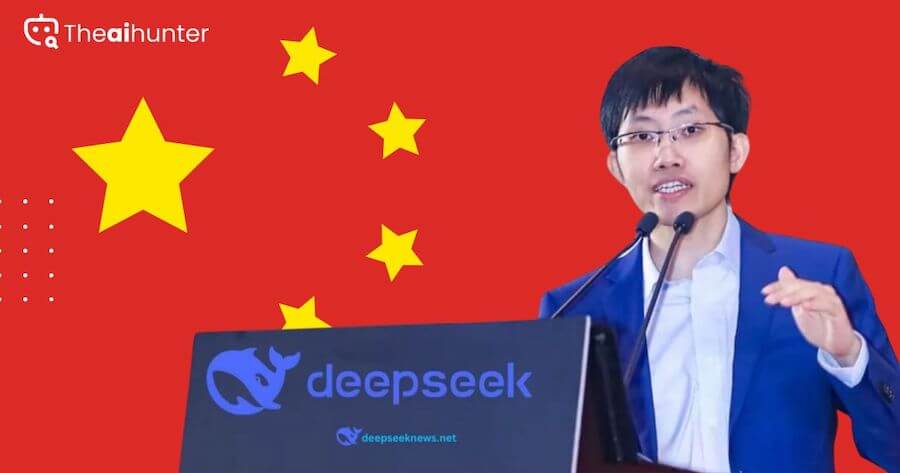Beijing is betting big on artificial intelligence (AI) as it looks for new economic growth drivers. At the center of this transformation is DeepSeek, a fast-rising AI startup that has taken China’s tech landscape by storm.
With its open-source AI model, DeepSeek is being rapidly adopted by major Chinese companies, state-owned enterprises, and even competitors.
AI’s Economic Impact: A Game Changer for China
According to Goldman Sachs, China’s economy will start seeing the benefits of AI adoption as early as next year. Over the long term, AI is expected to boost China’s GDP by 20 to 30 basis points by 2030.
The financial giant notes that DeepSeek’s rapid growth signals an even faster AI revolution in China than previously anticipated.
Stock markets are already reacting to this AI-driven momentum. The MSCI China Index has surged over 21% from its January lows, indicating renewed investor confidence in China’s tech sector.
DeepSeek’s Disruptive AI Model
DeepSeek has positioned itself as a major player in AI by developing a competitive model at a fraction of the cost of U.S. rivals. Its R-1 reasoning model is making waves, reportedly matching or even outperforming leading AI solutions while running on cheaper hardware.
The model’s open-source architecture has made it widely accessible, allowing businesses to integrate and modify it for greater efficiency at a lower cost. As a result, leading Chinese firms such as Alibaba, Huawei, and Tencent have already begun integrating DeepSeek’s AI into their operations.
Beijing’s Full Support
DeepSeek’s growing influence hasn’t gone unnoticed by the Chinese government. In a high-profile meeting, President Xi Jinping personally welcomed DeepSeek founder Liang Wenfeng, signaling strong official backing for the startup.
“DeepSeek represents exactly what Beijing wants in terms of ‘new-quality productive forces’ that will drive China’s economic growth,” said Huiyao Wang, founder of the Center for China and Globalization.
China has been pushing to develop cutting-edge technology in response to U.S. export restrictions on advanced semiconductors. AI, along with semiconductor development, is at the core of this national strategy.
AI Adoption Expands Across China
DeepSeek’s impact is being felt across multiple sectors:
- Public Administration: Local governments in Hohhot, Guangzhou, and Shenzhen are deploying DeepSeek-powered AI assistants to automate administrative tasks and improve public services.
- Telecommunications: At least three state-owned telecom companies have integrated DeepSeek’s AI into their operations.
- Corporate Adoption: Companies in automotive, finance, and cloud computing are leveraging DeepSeek’s AI to enhance productivity.
With DeepSeek rapidly becoming a global AI powerhouse, Beijing is using its success to showcase China’s tech resilience amid U.S. restrictions.
AI’s Challenges: Impact on Jobs and Workforce
While AI is boosting productivity, it also raises concerns about job displacement. Goldman Sachs warns that the rapid pace of AI adoption could lead to job losses in certain sectors, especially as China already faces high unemployment rates.
China’s youth unemployment rate remains above 15%, with over 10 million graduates entering the workforce annually. Sectors such as real estate, civil service, and finance have already seen layoffs in recent years.
However, Goldman Sachs notes that China’s labor market is less vulnerable to AI automation than the U.S. due to a higher share of jobs in manufacturing, agriculture, and construction, which require physical labor and are harder to automate.
By comparison, the U.S. workforce has a much larger share of jobs in finance and services, which are more susceptible to automation.
A Pew Research study in 2023 found that 19% of U.S. workers have high exposure to AI. However, the study emphasized that AI’s long-term effects, whether positive or negative, are still uncertain.
The Road Ahead
While AI adoption may lead to short-term job disruptions, experts believe that displaced workers will eventually find new opportunities in sectors where human skills remain crucial.
With Beijing’s strong backing, DeepSeek is set to play a central role in China’s AI-driven future, reshaping industries and potentially redefining the global AI landscape.
China’s tech resurgence, led by AI innovations like DeepSeek, is drawing fresh investor interest. As the nation pushes forward with its ambitious AI strategy, the global tech race is only set to intensify.








